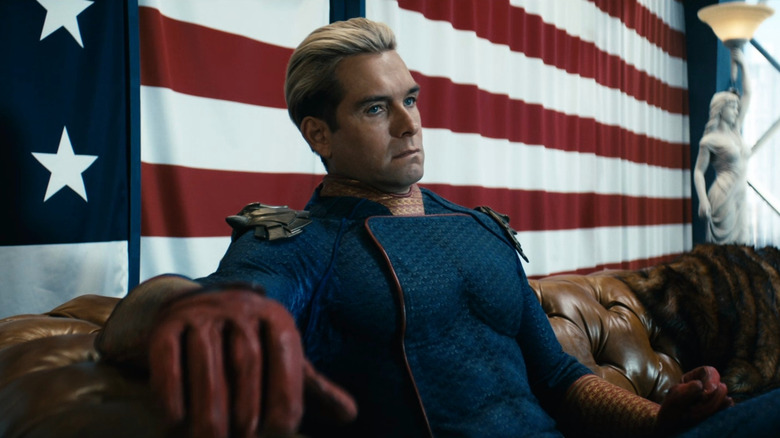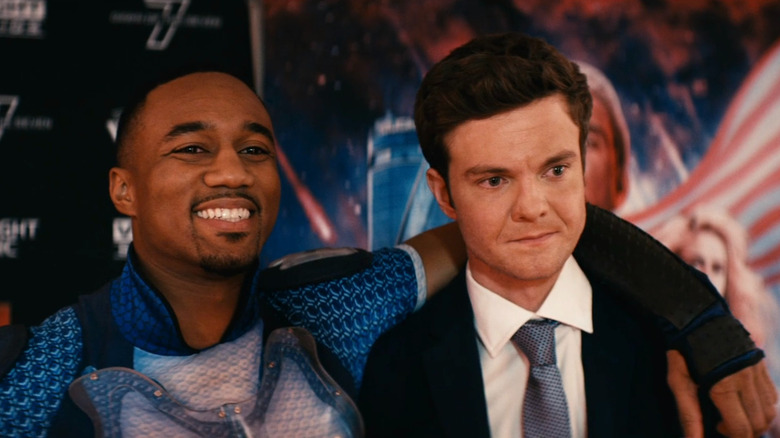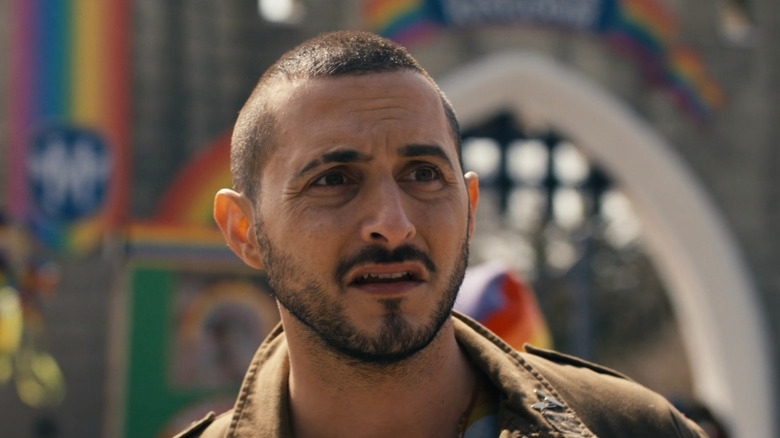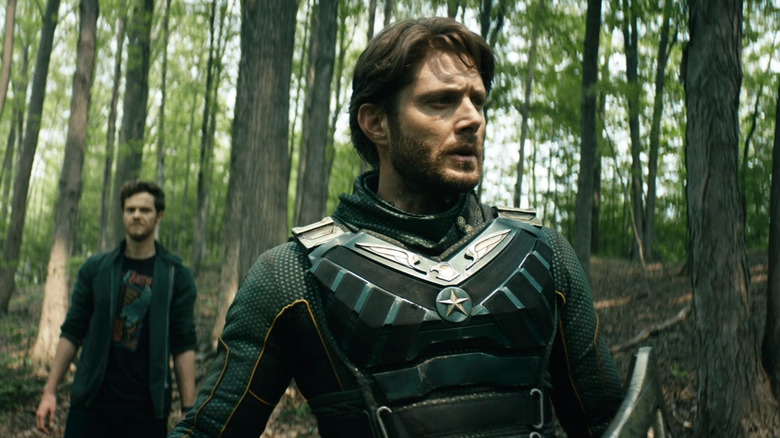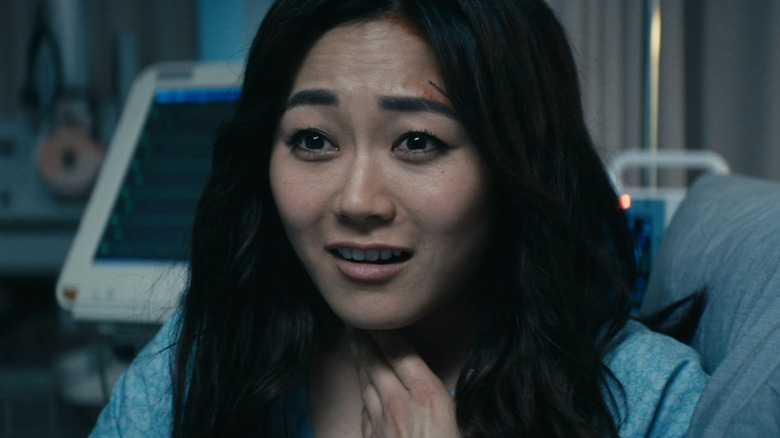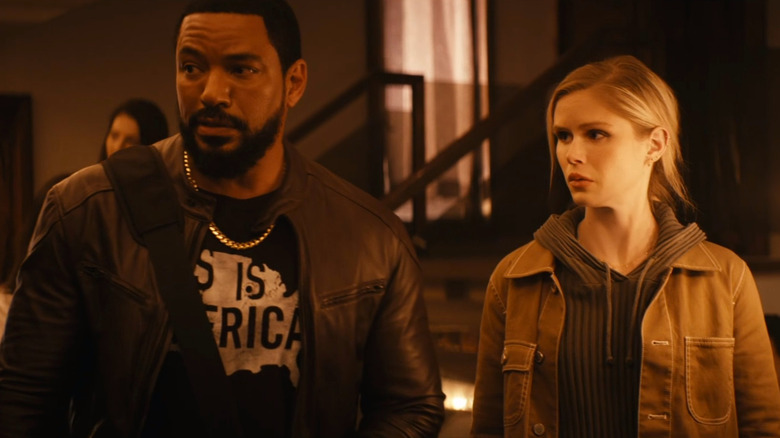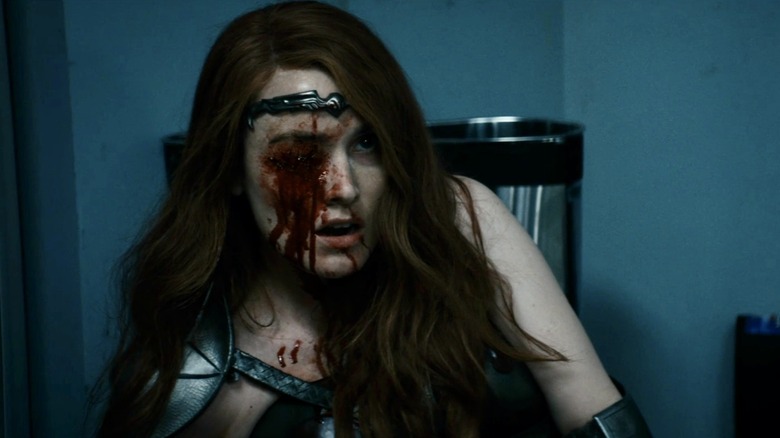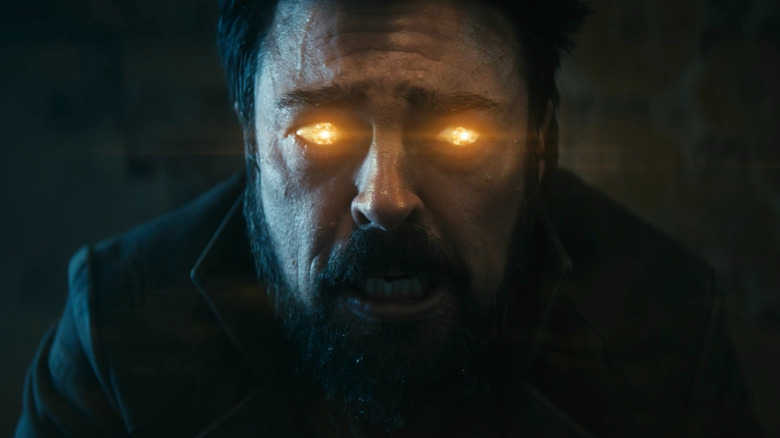The Boys Season 3 Spoiler Review: Eviscerating The Culture Of Superheroes And Lies In A Corporate-Run Dystopia
What makes "The Boys" more interesting than so many other milquetoast superhero movies and TV shows out there right now is the sense of genuine peril that pervades it. This is a show where a star-spangled demagogue imbued with Superman's powers is not above using his heat vision to laser the heads off innocent civilians. In season 3, Homelander (Antony Starr) is described as "a paranoid, malignant narcissist," and all throughout the series, those around him live under the threat that he could snap and kill anyone at any time.
That gives "The Boys" an underlying tension many of its caped contemporaries lack. It's as if the viewer is waiting for a bomb to go off — or radiation-infused Captain America analog Soldier Boy (Jensen Ackles) to detonate. Speaking of Marvel characters, in "The Boys" season 3, Billy Butcher (Karl Urban) also openly rewrites the old Spider-Man adage, "With great power, comes great responsibility," adding some pepper to it: "With great power, comes the absolute certainty that you'll turn into a right c***."
It's just another way of saying, "Absolute power corrupts absolutely," but it gets the point across. And of course, those words apply just as much to Butcher and Hughie (Jack Quaid) and their newfound dependency on the Temp V drug to power them up with their own superhuman abilities. From the very beginning — ever since the super speedster A-Train (Jessie T. Usher) turned Hughie's girlfriend into a splat on the street in the series premiere — it's been clear that "The Boys" is concerned with power and how those who have it tend to abuse it at the expense of others. This season, as it continues to explore the dark underside of Hollywood's aspirational superhero myths, it has only grown more vocal.
Spoilers follow.
This is America
More than just a satire for these dark times, "The Boys" season 3 is nothing less than a jeremiad against the cultural rot that has left us fixated on superheroes and celebrities and performative political correctness, while mass shootings continue unabated in the U.S. and the decline and fall of the new nationalist republic occurs in real-time. If that sounds overblown, just remember: this is a show with a superhero orgy. It doesn't take itself too seriously.
On the red carpet at the "Dawn of the Seven" movie premiere, Hughie is forced to endure a photo op with A-Train while Homelander — who enjoyed some rough sex with a Nazi last season — repeats a succession of lies across a succession of cameras, each capturing the same talking points about how he's "just a man who fell for the wrong woman." Later, Homelander makes a potato-porn pitstop to check in on said Nazi, the badly burned Stormfront (Aya Cash), whose ministrations with her one good hand expire with her dreams of an Aryan Übermensch army, leaving her without the will to power or the will to live.
Naturally, Vought International turns the star search for Stormfinder's replacement into a reality show. This is America, where "Thor: Love and Thunder" happened to hit theaters the same day that "The Boys" season finale hit Prime Video. Speaking as someone who recently wrote five straight "Love and Thunder" articles in one day, I have to wonder what the early buzz coming out of "Dawn of the Seven" would be like in our world, and if the assassination of a world leader that day would even be a blip on anyone's radar. No doubt, there would be people tweeting about how "Dawn of the Seven" was the "best Vought Studios movie yet."
Everyone's a hero
Not to beat a dead goat, but one thing "The Boys" does take seriously is Marvel memes, or at least the one about Ant-Man crawling up Thanos's butt. That gets written into the season premiere as a sex scene involving the shrinkable supe Termite (Brett Geddes). Here, and during the slightly overhyped "Herogasm" orgy — where Love Sausage (Derek Johns) brandishes his stretchable member and Mother's Milk (Laz Alonso) gets a different white fluid to the face — "The Boys" goes for the gross-out.
It's more disgusting than titillating, but maybe that's the point. We're meant to squirm and laugh uncomfortably at what we see in "The Boys." Superhero shock-jock tactics are maybe the only contingency left for a streaming title that hopes to pierce the white noise and snap its audience out of numbness to the real world and its fresh daily horrors.
"Truly there is no God here," observes Frenchie (Tomer Capon) as he and Kimiko (Karen Fukuhara) stroll through VoughtLand's rainbow capitalist Inclusive Kingdom, where everyone's a sing-song hero and veggie tacos and burgers with doughnut buns are sold to overweight theme park guests. Other food vendors include BLM BLTs, the Woke Wok, and LGBTurkey Legs.
The crass commercialization of social causes receives a further nod in A-Train's Turbo Rush Energy Drink commercial, which is hilarious but might seem ridiculous until you realize it's directly spoofing a real Pepsi commercial starring Kendall Jenner.
Butcher explores the flip side of VoughtLand in a gun show where metal detectors filter out everything but firearms while patriotic country music helps indoctrinate kids into the "silent majority" of the Vought Rifle Association. Before Butcher slices his head and car in half with his temporary eyebeams, Gunpowder (Sean Patrick Flanery) touts 2-for-1 sales on hollow points, exclaiming, "God bless, y'all!"
The Soldier Boy season
The overarching plot of "The Boys" season 3 arranges itself around Soldier Boy, with the first half concentrating on the search for the weapon that supposedly killed him and could possibly kill Homelander. As it turns out, that weapon is Soldier Boy himself, still very much alive and on ice in Russia. I never watched "Supernatural" so I wasn't all that familiar with the work of Jensen Ackles before this, but he gives Soldier Boy a commanding presence and makes a great addition to the season 3 cast, as does Paul Reiser, whose brief turn as The Legend sees him channeling movie producer Robert Evans.
My only complaint about Soldier Boy is that they build him up as this huge de-powering threat, an equal to Homelander, but then it feels like he still needs Butcher and Hughie's help and they have to triple-team Homelander during the "Herogasm" episode. In the finale, Butcher is able to go one-on-one with Soldier Boy, and as Homelander observes, "He's nothing. He's human," only moonlighting as a supe — the very thing he hates — because he's rather hypocritically juiced up on Temp V.
For Butcher, the ends (namely, enacting revenge on Homelander) justify the means. But if you're familiar with how his storyline plays out in the comic book series on which "The Boys" is based, it's understandable why they might be making him less sympathetic, more of a potential future antagonist, this season. It reminds me of that scene in "Peaky Blinders," where Cillian Murphy's antihero talks about the circle of politics and how if you go far enough left and far enough right, you'll meet in the same place. Butcher and Homelander represent opposite extremes yet it's Homelander who plays a better father to Ryan Butcher (Cameron Crovetti) this season.
More than words
To be clear, Homelander is still a monster in all other respects, and he's looking increasingly Trumpian now, not to mention Gollum-like, in that he's given to conversing with his own split personality in the mirror. (It yells, "Yahtzee!" back at him.) He's the world's most powerful man, but even that's not enough to mollify his deep insecurities, and it doesn't help that he's surrounded by yes men.
One of them is The Deep (Chace Crawford), who has carnal knowledge of an octopus this season as he fails upwards at Vought, speaking in empty platitudes like, "If you work hard enough, there's nothing you can't achieve. Hashtag dream big." Incidentally, when Extreme released the power ballad "More Than Words" on an album called "Pornograffiti," you have to wonder if they ever envisioned it soundtracking a tentacle-porn scene some three decades later.
There's a passing reference to Deep appearing on the Fox News show "Hannity," which, in turn, serves as the real-life model for Cameron Coleman (Matthew Edison), the VNN host who gets the scripts for his news show approved by Vought's talent director, Ashley (Colby Minifie). Coleman may not have a direct line to the White House as Hannity did during Trump's tenure, but his talking head is every bit a propaganda arm of the state.
The Legend calls the heroes at Vought "stage-managed silicone dolls," which leaves us identifying with the eponymous Boys, a team that comes to include two whiskey-chugging girls, Kimiko and Starlight (Erin Moriarty), by the end of the season. Kimiko and Frenchie give the season some tender moments, and while rendering Fukuhara mute in the tradition of fellow Japanese actress Rinko Kikuchi still feels iffy, she at least finds her singing voice in a musical fantasy and gives a committed sign-language performance.
Art with politics
Though Frenchie endures torture at the hands of his former boss Little Nina (Katia Winter), he fares better than Starlight's ex-boyfriend, Supersonic (Miles Gaston Villanueva), who seems like he belongs in the Backstreet Boys more than the Boys, anyway. After Supersonic's death and Starlight's stint as a sham power couple with Homelander, she realizes that bringing down Homelander from inside Vought isn't going to work.
Hughie keeps using his desire to save Starlight as an excuse to take Temp V, even though she tells him more than once that she doesn't need to be saved. It feels like a win when Starlight exposes the real murderous Homelander to her 190 million Instagram Live followers. And in their final confrontation with Soldier Boy, it's nice to see Hughie come around to trusting Starlight enough that he can go for the assist and turn up the studio lights to amplify her power. Season 3's very last scene, however, makes it clear that Homelander can now murder a heckler in broad daylight and still receive cheers from his supporters.
The first cheer comes from Todd (Matthew Gorman), the human face of Trumpism, as it were, who we've already seen Mother's Milk haul off and punch after he learned that his daughter Janine (Liyou Abere) had accompanied Todd to a Homelander rally. The audience might derive satisfaction from that punch, but big picture, it doesn't accomplish much. Mother's Milk, the tough yet vulnerable OCD glue holding the Boys together, can't knock sense into Todd any more than he can talk sense into him. The guy is too far down the conspiracy-theory rabbit hole, brainwashed by VNN.
Subplots like this might alienate viewers who prefer their art bland and without politics (or perversity), but at least "The Boys" has something to say.
Exit through the revolving door
"The Boys" remains incendiary but season 3 isn't without a few flaws. Some of the satire, such as the parody of Gal Gadot's "Imagine" sing-along video — using the same song — isn't exactly subtle. And as much as the show might pat itself on the back for upending the Bury Your Gays trope, it found another way to maintain that trope this season: by keeping Maeve (Dominique McElligott) on the sidelines, then seemingly writing her off the show.
Hearing Maeve say, "The truth is, you don't need me anymore," to Starlight just feels like "The Boys" subconsciously acknowledging in dialogue that it has subjugated a bisexual character to a straight WASP. I'm not sure having Maeve go missing for whole episodes, then come back in just to hook up with Butcher was really needed, or that it added anything to her arc.
She gets a heroic end, though, and while she comes out the other side of her knock-down, drag-out fight with Homelander missing an eye, it seems like Maeve will live happily ever after with her girlfriend Elena (Nicola Correia-Damude). Having Ashley cover up the fact that Maeve survived the mid-air explosion with Soldier Boy also has the function of showing that not everyone left inside Vought after Starlight's resignation is all bad.
Even Soldier Boy — the man out of time who still thinks Cosby is America's Dad — turns out to be right about the mind-controlled priest and nun who accost him and Hughie. "The Boys" season 3 was a good showcase for Ackles and they could have probably gotten more mileage out of his character beyond this year. Just when Black Noir is getting interesting, he, too, exits the narrative, with Homelander ripping his and our guts out at the same time. If it's any consolation, the actor who plays him, Nathan Mitchell, is circling right back around through the show's revolving-door cast as a new character next season.
'Supe lives matter'
Alone in the wreckage of his memories and hallucinations, Black Noir is the one-man audience for a show where a cartoon American eagle with Soldier Boy's voice bullies him and leaves him brain-damaged — a gonzo image that epitomizes the culture of candyfloss superhero entertainment and its potential lobotomization of the viewer as the country goes to hell in a handbasket. "The Boys" imagines a world, not unlike our own, where superheroes are the opium of the people, so much so that men will take up the chant "Supe lives matter" as if that really means something (more than, say, #ReleaseTheSnyderCut). As the Legend puts it:
"To be American means knowing you're the hero. So what do we do? We sweep all our filthy s*** under the rug, and we tell ourselves a myth like Soldier Boy. And I get stinking rich selling it."
Season 3 of "The Boys" ends with Kimiko powered back up on Compound V — by her own choice, so she can protect her family, Frenchie — while Butcher faces the prognosis that he has 12 to 18 months left to live due to his overuse of Temp V. Butcher rejoins his team, which is now much more distrustful of him, just in time to see the news that vice-presidential candidate Lamar Bishop (Graham Gauthier) has drowned.
It's the result of a covert, treasonous assassination that The Deep carried out in a swimming pool at Homelander's behest. Finally, those Aquaman powers come in handy. "The Boys" seems to be setting up Ryan and fill-in VP candidate Victoria Neuman (Claudia Doumit) as antagonists for season 4. Victoria, outed to Hughie as the Head Popper, already outmaneuvered her adoptive father Stan Edgar (Giancarlo Esposito) this season, and if it means protecting her daughter, she clearly has no compunctions about forging an alliance with a megalomaniac who derives sexual gratification out of milking a cow, then drinking the milk.
As the placard says: "God, guns, and Homelander." Three seasons in, "The Boys" continues doling out irreverence and speaking truth to power as an acidic subversion of the superhero-industrial complex.
